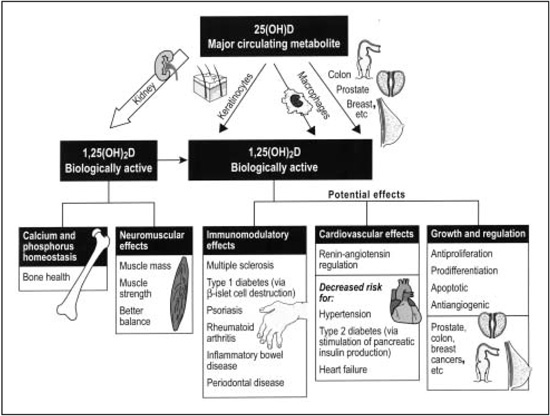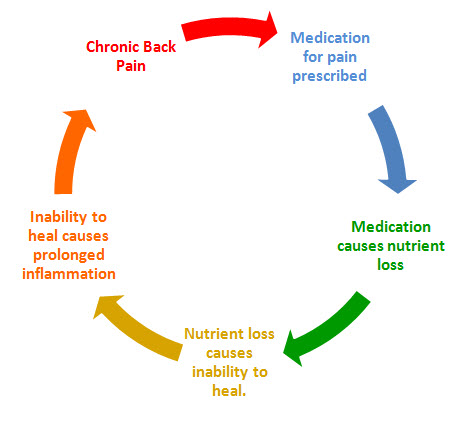Vitamin D (Cholecalciferol, D3)
Vitamin D is a fat soluble vitamin synthesized from cholesterol by the skin where it
is exposed to ultra-violet B radiation (sun exposure). Once vitamin D is
synthesized it is altered by the liver and kidney into its active form. Small amounts
are obtained from dietary sources. Recent research points to a vitamin D deficiency
epidemic in the U.S. Sunscreens (to include make-up) with an SPF (sun protection
factor) of greater than 8 inhibit the synthesis of vitamin D. Not only is vitamin D
necessary to maintain normal calcium levels, but it helps with the maintenance of
the neuromuscular system and the immune system. In addition, vitamin D has
genetic effects by regulating cell growth and differentiation. Some vitamin D
deficiency associated diseases include rickets, osteomalacia, osteoporosis, and
cancer. Recently, new research has identified vitamin D playing a role in the
prevention of diabetes.
Signs & Symptoms of Deficiency:
Poor immune function
bow legs (softening or malformation of the bones)
Muscle pain
Muscle weakness
Poor growth
Skin lesions (eczema)
Acne
Chronic infection
Sinus infections
Vitamin D has been shown to be beneficial in the following conditions:
Cancer
High blood pressure
Type I and Type II Diabetes
Osteoporosis
Rickets
Osteomalacia
Autoimmune diseases
Multiple Sclerosis
Drugs or additives that may deplete or interfere with Vitamin D metabolism:
Alcohol
Corticosteroids
Olestra (a food additive found in many fat free products)
Mineral oil (when taken consistently in higher doses)
Cholestyramine
Colesevelam (Welchol)
Colestipol
Statin medications – Although these medications have not been shown to
directly decrease vitamin D levels in research studies, they inhibit cholesterol
synthesis which could potentially effect vitamin D production.
Long term therapy with anti-convulsant medications is thought to interfere
with the liver and kidneys ability to activate vitamin D.
Isoniazid and Rifampicin (Antibiotics) are also thought to interfere with the
liver and kidneys ability to activate vitamin D.
Laboratory testing for Vitamin D:
25 OH-D is the most accurate way to measure this nutrient
Lymphocyte proliferation assays (Spectracell labs)
Food Sources:
Liver, cod liver oil, herring, salmon, mackerel, sardines, tuna, eggs, and
fortified dairy products
Vitamin D is a fat soluble vitamin synthesized from cholesterol by the skin where it is exposed to ultra-violet B radiation (sun exposure). Once vitamin D is synthesized it is altered by the liver and kidney into its active form. Small amounts are obtained from dietary sources. Recent research points to a vitamin D deficiency epidemic in the U.S. Sunscreens (to include make-up) with an SPF (sun protection factor) of greater than 8 inhibit the synthesis of vitamin D. Not only is vitamin D necessary to maintain normal calcium levels, but it helps with the maintenance of the neuromuscular system and the immune system. In addition, vitamin D has genetic effects by regulating cell growth and differentiation. Some vitamin D deficiency associated diseases include rickets, osteomalacia, osteoporosis, and cancer. Recently, new research has identified vitamin D playing a role in the prevention of diabetes. Vitamin D is a very safe and effective treatment to use in lieu of the flu shot.
Signs & Symptoms of Deficiency:
Poor immune function
bow legs (softening or malformation of the bones)
Muscle pain
Muscle weakness
Poor growth
Skin lesions (eczema)
Acne
Chronic infection
Sinus infections
Vitamin D has been shown to be beneficial in the following conditions:
Cancer
High blood pressure
Type I and Type II Diabetes
Osteoporosis
Rickets
Osteomalacia
Autoimmune diseases
Multiple Sclerosis
Alcohol
Corticosteroids
Olestra (a food additive found in many fat free products)
Mineral oil (when taken consistently in higher doses)
Cholestyramine
Colesevelam (Welchol)
Colestipol
Statin medications – Although these medications have not been shown to directly decrease vitamin D levels in research studies, they inhibit cholesterol synthesis which could potentially effect vitamin D production.
Long term therapy with anti-convulsant medications is thought to interfere with the liver and kidneys ability to activate vitamin D.
Isoniazid and Rifampicin (Antibiotics) are also thought to interfere with the liver and kidneys ability to activate vitamin D.
25 OH-D is the most accurate way to measure this nutrient
Lymphocyte proliferation assays (Spectracell labs)
Food Sources:
Sunlight is the best source of natural vitamin D. However; the following foods also contain some vitamin D – Liver, cod liver oil, herring, salmon, mackerel, sardines, tuna, eggs, andfortified dairy products.




 From:
From:











